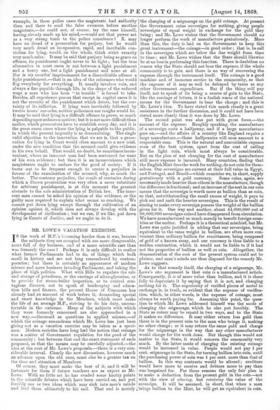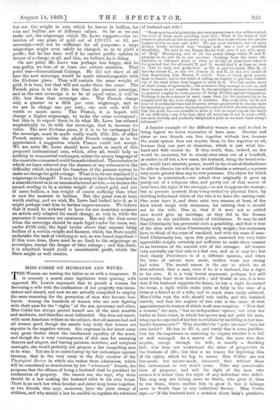MR. LOWE'S VACATION EXERCISE.
IS the work of M.P.'s becoming harder than it was, because the subjects they are occupied with are more disagreeable, more full of dry business, and of a more scientific cast than was formerly the case ? Perhaps it is only difficult to realize what former Parliaments had to do, of things which bulk small in history and are not long remembered by contem- poraries ; but there is certainly an appearance of modern science and mere business invading Parliament, and taking the place of high politics. What with Bills to regulate the sale and storage of petroleum, or the carriage of nitro-glycerine, or to provide for steam-boiler inspection, or to control con- tagious diseases, not to speak of bankruptcy and educa- tion bills and finance, the present House of Commons has already had an amount of work beforo it, demanding special and exact knowledge in the Members, which must make the life of an average M.P., striving to do his duty, uncom- fortable in the extreme. Many of the subjects with which they were formerly concerned are also approached in a new way,—discussed as questions in applied science,—of which the coinage conundrum which Mr. Lowe has just been giving out as a vacation exercise may be taken as a speci- men. Modern societies have long had the notion that coinage was a matter of Government regulation for the good of the community ; but between that and the exact statement of ends proposed, so that the means may be carefully adjusted,—the idea at the root of Mr. Lowe's proposals,—there is a very con- siderable interval. Clearly the new discussions, however much an advance upon the old ones, must also be a greater tax on the time and attention of Members.
Of course, they must make the best of it, and it will be fortunate for them if future teachers are as expert as Mr. Lowe. With no little art he has evaded some knotty points in the scientific debates which have been carried on, and put forcibly one or two ideas which may sink into men's minds and lead them ultimately to his end. That end is mainly the charging of a seignorage on the gold coinage. At present the Government coins sovereigns for nothing, giving people sovereigns of equal weight in exchange for the gold they bring ; and Mr. Lowe wishes that the Government should no longer perform the work of manufacture gratuitously. More than this, the duty is laid on the Government to keep this great instrument—the coinage—in good order ; that is, to call in the sovereigns which are below the due weight from time to time ; and Mr. Lowe wishes that the State should likewise be at no loss in performing this function. There is doubtless no reason why the State should not bear the expense, if the whole community is to gain and there is no way of recovering the expense through the instrument itself. The coinage is a good machine and of immense service to the community, so that the expense of it may as well be defrayed by taxes as any other Government expenditure. But if the thing will pay itself, not to speak of its being a source of gain to the State, like the carriage of letters, it is a foolish waste of the national means for the Government to bear the charge ; and this is Mr. Lowe's idea. To have stated this much clearly is a great assistance in the further discussion, and it could not have been stated more clearly than it was done by Mr. Lowe.
The second point was also put with great force,—the amount of the expense. Roughly speaking, the manufacture of a sovereign costs a halfpenny, and if a large manufacture goes on,—and the affairs of a country like England require a large manufacture,—those halfpennies will soon amount to a respectable sum. This is the natural and unavoidable expense even of the best system, apart from the cost of calling in the light coin, which must always be considerable. But on the plan of not charging for the cost of manufacture still more expense is incurred. Many countries, finding that the English Mint does the work for nothing, do not coin for them- selves. Our sovereigns are current at their full value in Egypt, and Portugal, and Brazil—which countries we, in short, supply gratuitously with a gold currency. Some coins, again, are necessarilymade heavier than others in the manufacture, though the difference is fractional; and an increase of the sort in our coin means that the sovereign is worth more as bullion than as coin, so that, notwithstanding the small excess of weight, it pays to pick out and melt the heavier sovereigns. This is the result of aiming to make every sovereign possess the weight of the bullion given for it. One way and another, about 44,000,000 out of 98,000,000 sovereigns coined have disappeared from circulation. We have manufactured so much merely to benefit foreign coun- tries or the melter. Perhaps it is a theoretical mischief, but Mr. Lowe was quite justified in adding that our sovereigns, being equivalent to the same weight in bullion, are often more con- venient than ordinary bullion for remittances, being composed of gold of a known assay, and our currency is thus liable to a sudden contraction, which it would not be liable to if it had not the properties of bullion as well as coin. Altogether, the demonstration of the cost of the present system could not be plainer, and men's minds are thus disposed for the remedy Mr. Lowe suggests.
As to that remedy itself, the charging of a seignorage, Mr. Lowe's one argument is that coin is a manufactured article. Consequently, it is of more value than bullion, and it is sheer folly to depreciate it by saying that it is not, and charging nothing for it. The superiority of verified pieces of metal in exchange is, in truth, so evident that the expense of verifica- tion, which, in other words, is the expense of coinage, must always be worth paying for. Assuming this point, the ques- tion to which Mr. Lowe addressed himself was the mode of charging the seignorage, which he also put forcibly. The State as coiner may be repaid in two ways, and to the State it makes no difference. It may either return less gold than there is in the present coin to the man who brings it, making no other charge ; or it may return the same gold and charge for the seignorage in the way that any other manufacturer would charge for the work done. But though this would not matter to the State, it would concern the community very much. By the latter mode of charging the existing coinage would be increased in value. People would not pay 1 per cent. seignorage to the State, for turning bullion into coin, until the purchasing power of coin was 1 per cent. more than that of bullion. In this way contracts would be altered ; creditors would have more to receive and debtors more to pay than was bargained for. For these reasons the only fair plan is to make a deduction from the present gold in the coin—not with the view of altering, but retaining the value of the sovereign. It will be assumed, in short, that when a man brings bullion to the Mint, he will get an equivalent in coin, but not the weight in coin which he leaves in bullion, for coin and bullion are of different values. So far as we can make out, the seignorage which Mr. Lowe suggests—the re- tention of one grain of gold out of 123.274, or 2d. per sovereign—will not be sufficient for all purposes ; a large seignorage might even safely be charged, so as to yield a profit ; but he has done well if he carries public opinion in favour of a charge at all, and this, we believe, he is doing.
On one point Mr. Lowe was perhaps less happy, and he was guilty, we fear, of at least one serious omission. That point was—International Coinage. He did not show at all how the new sovereign would be made interchangeable with the 25-franc piece. They will contain the same weight of gold, it is trae, but that will not make them the same. The French piece is to be 22c. less than the present sovereign, and as the new sovereign is to be of equal value, it will be 22c. less than that sovereign also. The French charge only a quarter or a fifth per cent. seignorage, and as we are to charge one per cent., our new coin will be worth so much more. The French, it is hoped, will charge a higher seignorage, to make the coins correspond ; but this is to expect them to do what Mr. Lowe has refused emphatically to do with the sovereign, that is, increase its value. The new 25-franc piece, if it is to be exchanged for the sovereign, must be made really worth 25fr. 22c. of other French money, unless the whole French coinage is to be appreciated, a suggestion which France could not accept. We are sorry Mr. Lowe should have made so much of this proposed international coin, which, after all, would help us nothing in commercial exchanges, unless the money language of the countries concerned could be made identical. The omission to which we have referred was the absence of any reference to the difficulty which induced the founders of the present system to make no charge for gold coinage. What is to be our standard if a seignorage is charged? It may be as easy to have the standard in a manufactured as in an unmanufactured article,—to declare the pound sterling to be a certain weight of coined gold, and not of mere bullion, a less weight of course sufficing than what is now the measure in bullion. But the point was at least worth stating, and we wish Mr. Lowe had looked into it, as it might perhaps lead him to farther improvements. We believe that it would be awkward to have for our monetary measure an article only adapted for small change, as coin is, while the payments it measures are enormous. Has not the time come when the sovereign should be made legal tender for sums, say, under £100 only, the legal tender above that amount being bullion of a certain weight and fineness, which the State might undertake the task of verifying or not, as was found expedient ? If this were done, there need be no limit to the seignorage on sovereigns, except the danger of false coinage ; and this limit, it is admitted, would yield a considerable profit, which the State might as well receive.































 Previous page
Previous page